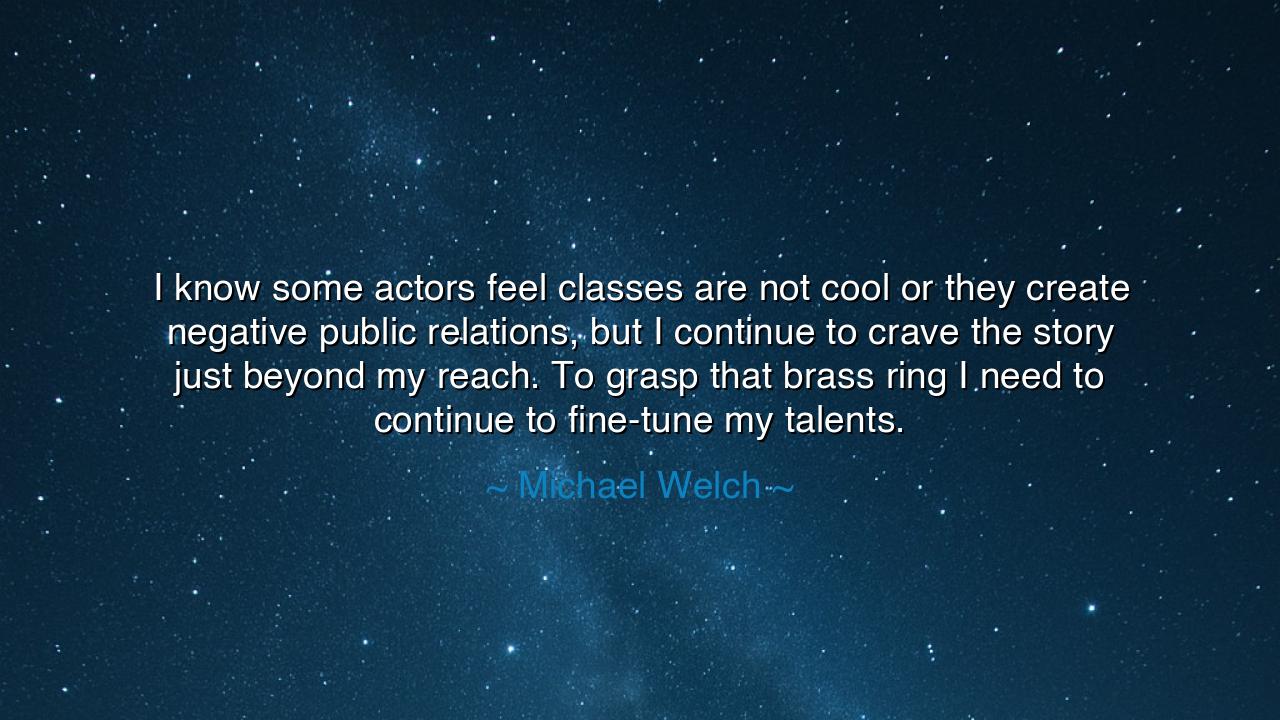
I know some actors feel classes are not cool or they create
I know some actors feel classes are not cool or they create negative public relations, but I continue to crave the story just beyond my reach. To grasp that brass ring I need to continue to fine-tune my talents.






"I know some actors feel classes are not cool or they create negative public relations, but I continue to crave the story just beyond my reach. To grasp that brass ring I need to continue to fine-tune my talents." These words, spoken by Michael Welch, speak to a profound understanding of growth, dedication, and the relentless pursuit of mastery. In an industry like acting, where talent is often seen as a gift—something that can be tapped into naturally—Welch’s words highlight an important truth: even the most skilled individuals must fine-tune their abilities to achieve greatness. He does not view learning and development as an afterthought or a hindrance, but as an essential process that will allow him to reach beyond his current limitations and fully embrace his craft.
In the ancient world, this understanding of self-improvement was deeply rooted in the teachings of the philosophers and artists. Aristotle, in his work Nicomachean Ethics, spoke of the idea of virtue not as something innate, but as something that must be cultivated through habit and practice. Similarly, the great Greek tragedians, such as Sophocles and Euripides, honed their craft not by relying solely on their natural talent, but through study, reflection, and an ongoing commitment to improving their understanding of human nature and the complexities of the human condition. Just as these ancient playwrights worked tirelessly to perfect their art, Welch’s words underscore the idea that true mastery requires constant self-refinement.
The brass ring that Welch mentions represents the ultimate goal or achievement—an ideal that is often just beyond reach, yet always worth striving for. In ancient mythology, the idea of the golden apple in the story of Hercules and his twelve labors symbolizes a goal that is both highly sought after and challenging to attain. The golden apple is a reward for strength, determination, and skill, but it requires a great deal of effort to reach. Similarly, the brass ring represents the aspiration that drives Welch to continue refining his abilities, even when his talent is already recognized. The reward for his efforts will not only be the achievement of that elusive goal but the growth that comes from striving toward it.
Consider the story of Leonardo da Vinci, whose genius in both art and science was not a result of mere natural talent, but of his tireless pursuit of knowledge and self-improvement. Leonardo was known for his insatiable curiosity, constantly refining his techniques in painting, anatomy, engineering, and mechanics. He famously never considered himself a complete master of any of his fields, always seeking to learn more, always pushing himself to reach new heights. His pursuit of the brass ring of perfection is evident in his sketchbooks, where he continually studied the world around him, seeking to understand it more deeply. Just as da Vinci spent his life fine-tuning his talents, so does Welch commit to continual learning, understanding that greatness comes not from resting on one’s laurels, but from striving for excellence at every stage of one’s career.
The lesson in Welch’s quote is one of humility and dedication. He acknowledges that while many may feel that further training or refinement is unnecessary, the true artist knows that growth is an ongoing process. It is not enough to simply rely on natural ability or the recognition of past accomplishments. Instead, greatness is achieved by continuing to fine-tune one’s craft, by pushing beyond comfort zones and seeking out the knowledge that will allow us to transcend our current limitations. Just as Plato wrote in The Republic about the importance of the philosopher-king striving for knowledge and truth, so too must the artist, the athlete, or the leader continually seek to perfect their understanding and refine their abilities.
In our own lives, the challenge is clear: do not settle for what you have already achieved. Whether in art, business, personal growth, or any other pursuit, there is always more to learn, more to improve, and more to achieve. The pursuit of excellence is not an end goal, but a journey—one that requires constant effort, reflection, and refinement. Welch’s dedication to improving his craft reminds us that true success comes not from what we’ve already accomplished, but from our continued commitment to grow and reach for what is just beyond our current grasp.
Let us take Welch’s words to heart and apply them in our own lives. Whether we are in a creative field or not, we must constantly seek to develop and refine our skills, never allowing ourselves to become complacent. The brass ring may be elusive, but the effort to grasp it brings growth and satisfaction in itself. Embrace the journey of continuous improvement, and know that it is through this process that we can achieve the highest potential of our abilities. Strive, as da Vinci did, as Welch does, to never stop learning, never stop reaching, and never stop improving.






AAdministratorAdministrator
Welcome, honored guests. Please leave a comment, we will respond soon